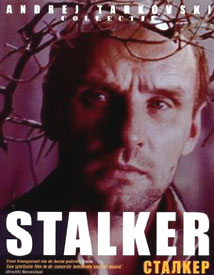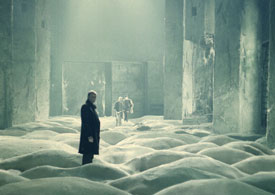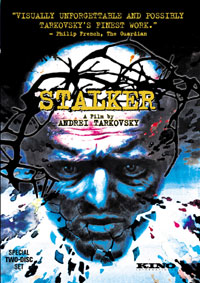 A "Stalker" according to the film Stalker (Ctankep1979) is something like a Mexican "coyote." Stalkers are guides who can lead people into "the Zone," a mystical location that a war-based & possibly dystopian society has failed to conquer.
A "Stalker" according to the film Stalker (Ctankep1979) is something like a Mexican "coyote." Stalkers are guides who can lead people into "the Zone," a mystical location that a war-based & possibly dystopian society has failed to conquer.
The Zone has been hemmed in with barriers & soldiers at guard-points. It exists as a place of fear & a place of hope, but without a Stalker as guide, no one can survive the journey.
Most science fiction & especially the filmic variety exists for the child in each of us, at any age, but Stalker is for whatever we can find in ourselves that has intellect & maturity & even sadness attached. There's an incredible musical score, sometimes rather aboriginal in tone. The cinematography is fabulous, & before our three downtrodden depressed fellows reach the Zone, the "real" world they live in is sepia-toned silvery deep-focus eeriness.
Sneaking through the ruins on the border of the Zone, only when they survive the machine gun fire of the army & make their way deep into the zone does the world achieve color. At first it seems likely to be some kind of sactuary, a rural paradise, but the illusory qualities make it seem even more apt to be a terrible trap for which reason no one living lives there.
Stalker is a long, long, long movie like most of Tarkovsky's films. You have to be "into" the philosophical or angsty conversations of the unhappy trio; otherwise the viewer will not find it interesting. I found it interesting indeed, & whoever doesn't expect their dose of science fi;ction to be child's stuff will probably also delight in Tarkovsky's moody strange film.
The Stalker, the Professor (or Scientist), & the Author are credibly on a mystic quest, even if not one that will ever make more than surreal sense. The Professor (Nikolai Grinko) is seeking something that will prove him a genius, set him on the road to the Nobel Prize, or just reassure him life has meaning; or so it seems until a more horrid intent is revealed.
The Writer (Anatoli Solonitsyn) is searching for inspiration, a cure for writer's block, a reason to believe that having written anything ever mattered. And the Stalker (Aleksandr Kaidanovsky) seems to labor under some sort of morbid messiah complex, hoping to bring the broken, the lonely, the failed to a place of salvation, & disillusioned at every turn.
There is alleged to be a room in a ruined building in the heart of the Zone where one's deepest wish will come true. The fear is that you may think you will wish for wealth or happiness or good luck, but you won't really know what desire lies deepest within until it is manifest. You may have planned to wish that the dystopian world outside the Zone is improved, that all people are made happy & free; but the sad fact is, in the deepest core of a human being, all desire is selfish, not noble.
 Whether such a room even exists is a dubious proposition, but the idea of it is the only thing left in the world worthy of faith of hope. The circuitous route the Stalker demands they take may or may not be for any purpose but his own paranoic ego. Whether such a room even exists is a dubious proposition, but the idea of it is the only thing left in the world worthy of faith of hope. The circuitous route the Stalker demands they take may or may not be for any purpose but his own paranoic ego.
So too we're told the Zone shifts & changes in nature & has a kind of sentience with inexplicable & vague demands which, if not properly addressed, will enrage the Zone & cause it to kill. One can never visit the same place by the same route twice in a row, though we're not really shown this is true.
Many other "rules" & strange realities predominate in the Zone, but generally it seems just as likely that these assumptions or beliefs exist only in the myth-making imagination of the Stalker & the faith or hope of the his clientelle.
How much of the Zone is an illusion from within the characters themselves, & how much it is the Zone itself geninely impinging upon their imaginations & their physical world, is never clear. It remains always more of a spirit-quest than a mapped journey.
In tone & the slow timing, one is reminded most of the most intimately experimental Hungarian films of Bela Tarr, especially Werckmeister harmoniak (2000). Or it just reminds one of other of Tarkovsky's films, notably Solaris (1972).
The closet director of the kind that America possesses is David Lynch, though to be sadly frank, Lynch has deteriorated as a filmmaker & never after Eraserhead (1977) approached the maturity of a Tarr or Tarkovsky. They all do share an unwillingness to tell a straight-forward story, striving instead for something spiritually tragic & strange.
copyright © by Paghat the Ratgirl
|

